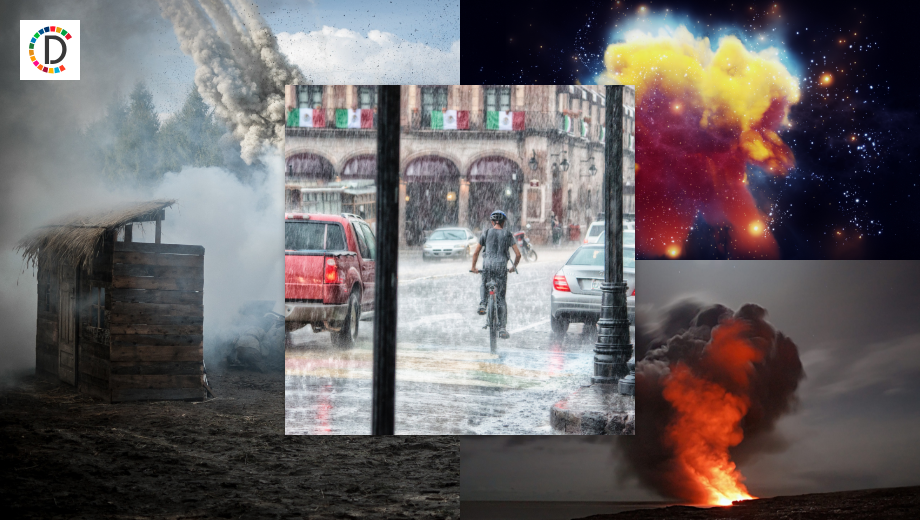INTERVIEW-Pawn to queen? Africa eyes 'climate chessboard' shake-up at summit
* Africa seeks greater climate role, says top scientist * Summit found failing to confront risks of exceeding 1.5C * Concerns over 'chronic oversight' on adapting to warming By Alister Doyle OSLO, Sept 7 (Thomson Reuters Foundation) - African leaders sought a stronger role in solving climate change at a summit this week - akin to the continent being a chessboard queen rather than a pawn - yet failed to confront the growing risks of global warming, a top African scientist warned. The Nairobi Declaration issued after Africa's first climate summit on Sept.

* Africa seeks greater climate role, says top scientist
* Summit found failing to confront risks of exceeding 1.5C
* Concerns over 'chronic oversight' on adapting to warming
By Alister Doyle OSLO, Sept 7 (Thomson Reuters Foundation) - African leaders sought a stronger role in solving climate change at a summit this week - akin to the continent being a chessboard queen rather than a pawn - yet failed to confront the growing risks of global warming, a top African scientist warned.
The Nairobi Declaration issued after Africa's first climate summit on Sept. 4-6 portrayed the world's poorest continent as a potential clean energy superpower and a source of solutions based on rich natural resources, from forests to sunshine. That marks a huge turnaround, according to Debra Roberts of South Africa, a veteran U.N. climate scientist.
"If we think of the climate change response as a chessboard, I think Africa is always seen as a pawn at the whim of more powerful pieces," she told the Thomson Reuters Foundation. "What Africa is saying with this declaration is that ... 'we are actually the queen'," said Roberts, who is chief resilience officer of eThekwini municipality, which includes Durban.
"That is a great strengthening of the African narrative," she said. "From vulnerable and 'please help us' to 'we are equal partners and in fact you can't win this game without us'." At the Africa Climate Summit (ACS), the continent's leaders urged new global taxes to help economic development, a bigger role in carbon markets and funds such as for "loss and damage".
Africa gets just 2% of global clean energy spending, according to the International Energy Agency (IEA). AFRICA CLIMATE SUMMIT'S 'CHRONIC OVERSIGHT'
Roberts said the summit made a "chronic oversight" by failing to focus properly on how Africa would adapt to the risks of a sharply warmer world. Africa's 1.2 billion people account for only about 4% of greenhouse emissions from energy, but are acutely vulnerable to the worsening impacts.
And global warming is set to overshoot 1.5 degrees Celsius (2.7 degrees Fahrenheit) above pre-industrial levels, the most ambitious goal of the 2015 Paris Agreement, in the coming years, Roberts said. Temperatures are already up about 1.2C. "Anyone who has read the science ... and has the vaguest degree of common sense knows that we are going to cross 1.5C," she said. "The Nairobi Declaration doesn't own up to that."
"A world of overshoot for Africa is a disastrous place, a place of existential crisis," said Roberts, who was one of four contenders to be the next head of the U.N.'s panel of climate scientists in a vote in July. She had the backing of the African Union, but lost out to British scientist Jim Skea. REFORMING THE GLOBAL FINANCIAL SYSTEM
The declaration said the world is not on track to cut emissions by an unprecedented 43% this decade, the level required to stay below 1.5C, but had little to offer about the risks of missing that target. Roberts said Africa will have to do far more to adapt to heatwaves, droughts, floods, crop failures, extinctions of animals and plants, and more disease in a world above 1.5C.
The Nairobi Declaration also called for a sweeping overhaul of the multilateral financial system. But in Africa, simpler solutions are often needed, according to Roberts. In April 2022, for instance, floods washed away homes in Durban's Quarry Road settlement but no one died because women leaders were alerted by WhatsApp messages and helped families to evacuate.
"You can't go to a multilateral development bank and talk about small-scale loans for women in informal settlements to keep cellphones ... so they can receive messages warning them of these climate extremes," she said. And reforms to the global financial system may simply take too long, Roberts warned.
"Moving us from pawn status to queen status is great, but that means a massive turnaround in the multilateral development banks, the financial system, debt relief, debt pausing," she said. The ACS stressed a need for drastic cuts in emissions and reforms by 2030, but Roberts said "on the basis of geopolitics I see around me, I cannot see that happening". (Reporting By Alister Doyle, Editing by Kieran Guilbert. The Thomson Reuters Foundation is the charitable arm of Thomson Reuters. Visit https://www.context.news)
(This story has not been edited by Devdiscourse staff and is auto-generated from a syndicated feed.)
- READ MORE ON:
- Alister Doyle OSLO
- Jim Skea
- eThekwini
- Kieran Guilbert
- U.N.
- Fahrenheit
- South Africa
- Paris Agreement
- Nairobi
- Quarry Road
- British
- Roberts
- Durban
- Thomson Reuters Foundation
- The Thomson Reuters Foundation
- The Nairobi Declaration
- the International Energy Agency
- African
- Thomson Reuters
ALSO READ
Tragedy Strikes: South African Miners Presumed Dead After Ekapa Mudslide
South African Fighters Return from Ukraine: A Diplomatic Dilemma
South African Woman Acquitted Amidst Probe Failures in Heroin Case
South African Mercenaries Return: Legal and Diplomatic Implications
Ambassadorial Mission: Bridging U.S. and South African Tensions










